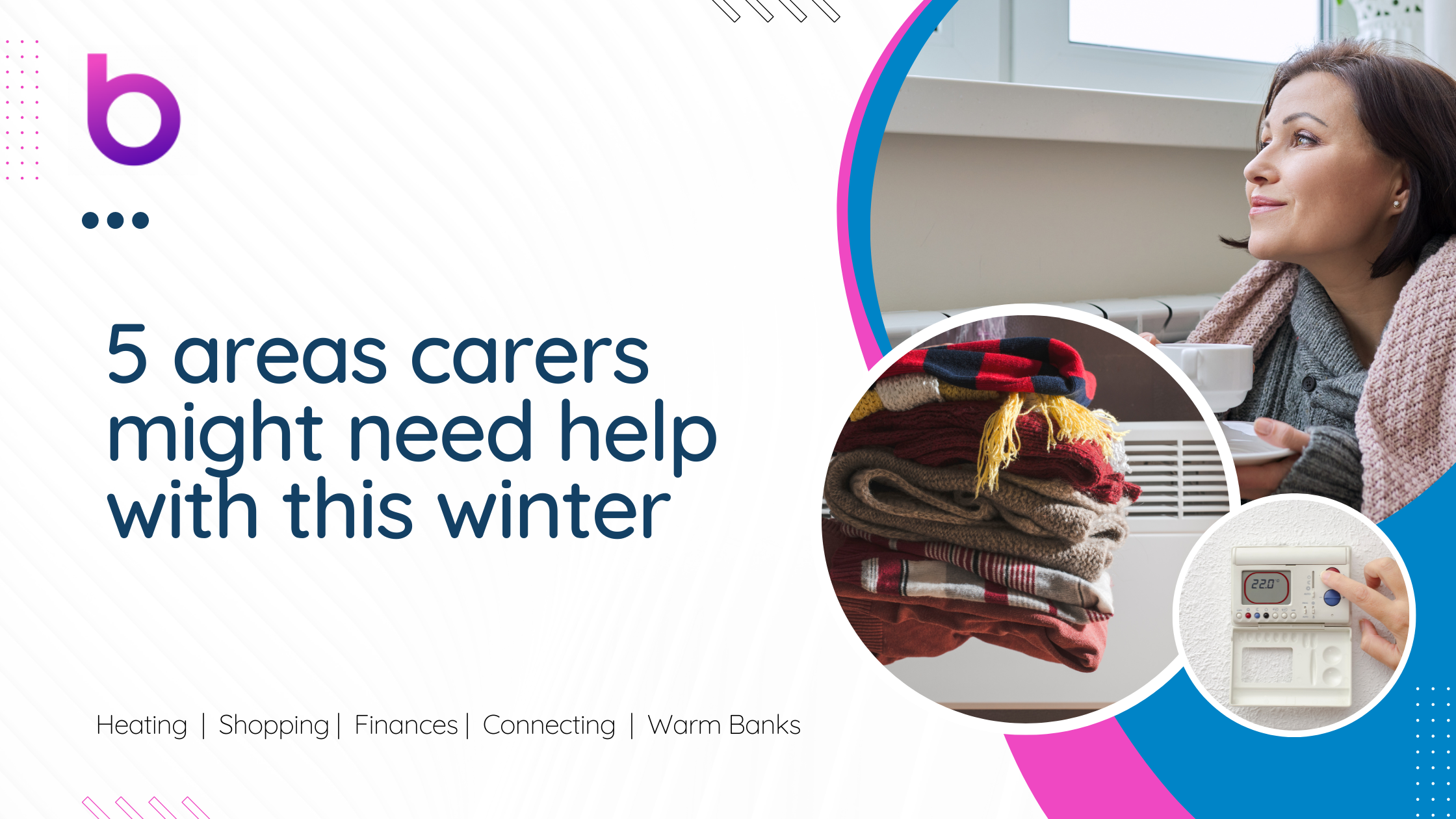The rising cost of living and the impact to family carers
Despite the sparkle of the festive lights, winter can feel dull and dreary when you’re on a tight budget. Many of us caring for a friend or family member know all too well how much of a s-q-u-e-e-z-e finances are facing this particular winter.
The rising cost of living is putting pressure on carers and the people they care for throughout the UK. Many carers have fixed incomes and limited resources, and – as a result, often find creative ways to make ends meet. It’s important to remember that you aren’t alone. Other carers have found a range of practical ideas and strategies to help with feeling more at ease with winter pressures.
Here we share some of the best tips and ideas for surviving and thriving in winter 2022 / 2023.
- Shopping and cooking tips
- Help heating your home
- Community warm banks
- Accessing financial support
- Find ways to connect
Shopping and cooking tips
Savvy shopping and thrifty cooking can make a difference to tight budgets. When its cold outside, it is important for your health to eat nutritious and hot meals and consume hot drinks. Batch cooking and then freezing meals can help to reduce costs per portion, particularly if you can include produce that is reduced in price.
Vegetables close to their use-by date, for example, may be heavily discounted and can be cooked and then blitz into a warming soup. Its worth a scour of the reduced section of supermarkets (or even social supermarkets if you do have one in your area) to see what you can purchase cheaply and then freeze for another day.
And, if you are stuck for cooking inspiration, the Thrifty Ways Old Style Money Saving forum on Martin Lewis’ Money Saving Expert website has plenty of shared wisdom you can tap into for ideas. If you are time rich but cash poor, you may find Olio to be of use – this app allows you to locate free food that would otherwise end up in landfill.
Consider cooking options, also. Slow cookers, microwaves and air fryers are lower-cost options when compared to cooking in the oven, for example. One idea for saving money on cooking costs, and can also be helpful if you haven’t got time to watch a pot cooking on the stove, is to give hay-box cooking, also known as insulation cooking or a wonderbag, a try.
This method of cooking meals involves getting food to a given temperature for a short period of time, and then placing the cooking pot in a heavily insulated box or container where the residual heat continues the process of cooking without the need for fuel.
There are plenty of online guides to making and cooking with a haybox and Facebook groups dedicated to sharing tips and recipes. You may also find local environmental initiatives and charities offer free or low-cost wonder bags created from waste materials.
Help heating your home
Heating your home is a challenge this winter. Fuel cost increases mean many of us are tempted to leave the heating off and shiver our way through. However, being cold is not good for physical or mental health. Age UK are advising older people to do all they can to stay as warm as possible. Martin Lewis’ Money Saving Advice website adopts the cost-effective approach of finding ways to heat the human, not the home. Thermal layers, blankets, hot water bottles and rugs and slippers can all help you to stay warm and safe this winter.
You may also like to look at options for home insulation to help save on fuel costs. Many carers are eligible for free boiler checks and cavity wall insulation. Even if you don’t qualify for grants to cover the cost, increasing your home’s insulation can quickly bring a return on initial investment, saving you money in the long run.
If you do find yourself struggling to pay your energy bills, talk to your supplier as early as possible. They have a responsibility to help if you\’re struggling by offering, for example, an affordable payment plan.
Community warm banks
The cost-of-living crisis has prompted councils and charities throughout the UK to open more than 3000 “warm banks” this winter.
Warm banks are free, warm, welcoming spaces for anyone struggling with the cost of living. Warm banks mean people who’d otherwise be sitting in a cold, unheated home or worrying about heating bills can come to stay warm with others.
Many libraries, community hubs and places of worship have offered their facilities as locally accessible warm banks – sometimes also serving free or low-cost drinks and food and providing pastimes and activities.
The Warm Welcome website offers a virtual map to help people locate their nearest Warm Bank.
Many Carers Trust Network Partners are also offering Warm Banks to specifically support local carers and the people they care for – contact your nearest Carers Trust Centre to find out what’s on near you.
Accessing financial support
There are a range of forms of support to help with energy bills that you may be entitled to. Households to get up £350 help this year to help with rising energy prices. Martin Lewis has a Money Saving Expert article that can help you to identify what help is available. For example you may be eligible for the Warm Home Discount scheme which aims to support more than 50,000 vulnerable people in the UK with energy bills over the winter. And if there is someone aged 66 or older in your home, you could get up to £300 with the tax-free winter fuel payment.
If you’re an older carer or care for an older person, you can contact the Age UK free national advice line on 0800 169 65 65 to check you’re both receiving all the financial support available, including key benefits such as Pension Credit and Attendance Allowance.
Find ways to connect
The cold days and dark nights make it more challenging to get out and about and socialise. That puts us at ever greater risk of social isolation and loneliness. Sadly, we know that year-round, a staggering 80% of carers say they’ve felt lonely or socially isolated as a result of their caring responsibilities, with cold and damp winter weather potentially further increasing feelings of loneliness.
Whilst this is the first Christmas since the Pandemic without Covid-19 restrictions in place, the very latest research shows that compared to pre‐pandemic levels, caregivers have experienced a significant increase in burden, loneliness, and isolation since the outbreak of coronavirus.
It’s difficult to care for someone whilst recognising that this commitment places limits on socialising or having social contact outside the house.
It\’s important we find ways to connect as carers. Whether that’s online, by phone or face-to-face, keeping in touch with others is critical for our mental health and wellbeing. Many carers benefit from respite activities and provision funded via a Local Authority Carers Assessment or provided via Charitable organisations, such as Carers Trust.
Other carers have found connection in online communities, groups and forums. The Pandemic certainly helped many of us get to grips with Zoom calls as a way of connecting and that can open up options for meeting with others without leaving the house.
Consider hobby focussed and social groups dedicated to a shared interest. It’s also worth looking at what your local Adult Education provider has to offer in terms of both face-to-face and online free courses for carers.

